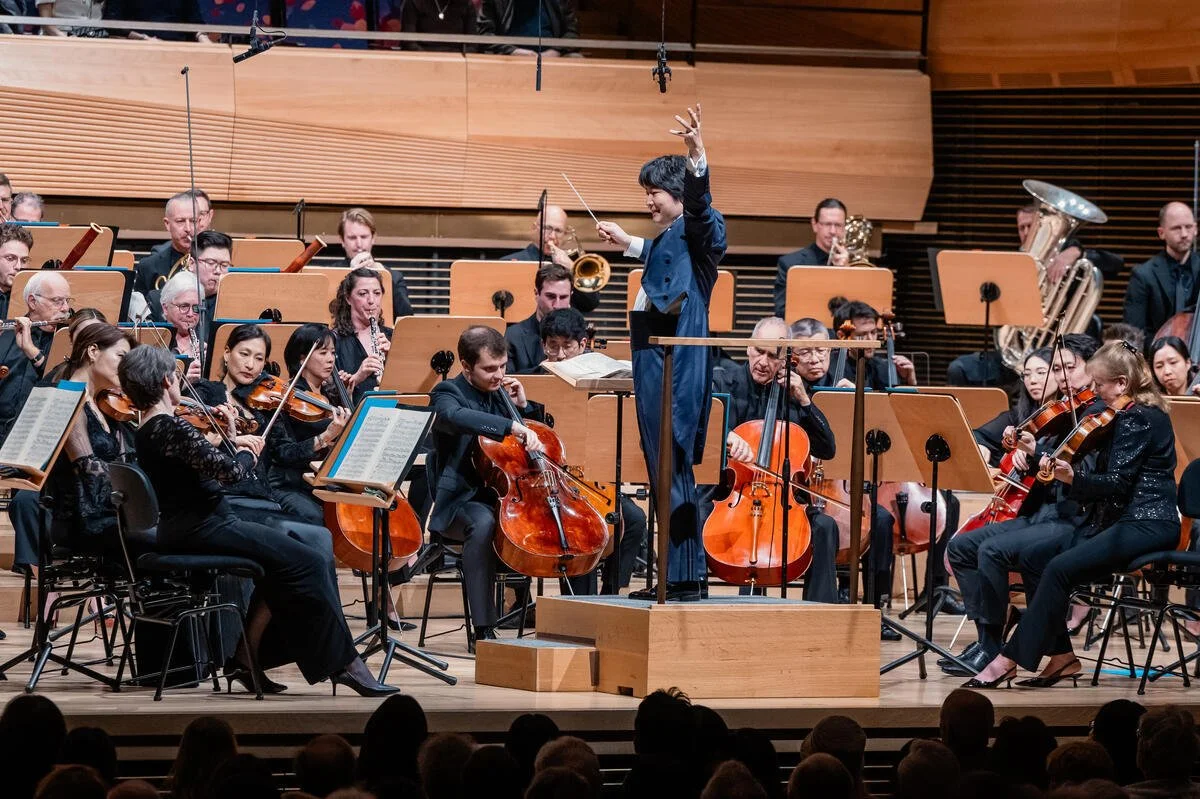REVIEW: Nimble, Precocious Yunchan Lim With NY Phil
Above photo by Brandon Patoc.
November 30, 2024
The COVID-19 pandemic may be largely in the rear-view mirror. But the landscape of live music, and the world’s performing artists, still reverberates with its effects. Composers confronted the uncertain period of shutdowns by continuing to compose, and four years later, the fruit of social distancing continues to emerge from behind the masks and plexiglass.
Case in point: Japanese composer Dai Fujikora’s tone poem Entwine, which opened the New York Philharmonic’s recent week of concerts under the elegant baton of Kazuki Yamada, in his debut with the orchestra. Fujikora was commissioned to compose the piece in 2020, before vaccines provided a clearer path for audiences’ return to the concert hall. His response was to seek an expression of, and a balm for, the elemental hole the pandemic created in our lives: “the physical touch we can no longer take for granted,” Fujikora writes, “and how we can feel socially awkward now by stepping out of the door and having to make sure we are standing far enough away from the other people in the street.”
Elegantly and efficiently, this brief piece for compact orchestra transported us back to those languorous days of spring and summer 2020. Fujikora’s poetic mood-piece, sparing of melody, unfolds like a mysterious journey — a haunted house — as the harmonies slowly evolve from bittersweet and questioning to discomfort and horror. The Philharmonic musicians applied a light touch to this transparent piece, making unusual techniques like flutter-tonguing sound natural, as if playing non-western instruments. The ending, a fade-out to hopeful, high violin harmonics, was ethereal.
Photo by Brandon Patoc.
Out of the pandemic also sprung up a new crop of virtuosos, undoubtedly bolstered, and saddled, with additional time to practice, but less time to perform (and socialize). Perhaps most striking is Yunchan Lim, a South Korean pianist who burst onto the scene as the youngest-ever winner of the 2022 Van Cliburn International Piano Competition at the fledgling age of 18. Lim dazzled in a you-had-to-see-it-to-believe-it facility in Rachmaninoff’s Third Piano Concerto and Liszt’s Transcendental Etudes.
Taking the stage as soloist in Chopin’s Piano Concerto No. 2 in F Minor, Op. 21, Lim emerged from the wings and greeted the audience dutifully, in a stupor— as if he was performing under duress, or sleep-walking. Not emitting so much as a blink or a smile, you wouldn’t have predicted the sensuality that would soon ooze from his fingers. Accompanied meticulously by Yamada and the Philharmonic, who juiced as much color out of Chopin’s subtle orchestration as possible, Lim gave a stunningly nimble and entertaining account of Chopin’s early showcase for his own talents.
Yamada shaped the orchestral exposition of the first movement, Maestoso, with Mozartian poise — rounded phrases and agogic punctuation. Lim’s entrance, a heralding outburst followed by an agitated restatement of the opening theme, claimed center stage with a sudden fearlessness. Flying sixteenth-note passages were windblown torrents of pelting rain. The pianist palpated the various angles and textures of Chopin’s moods, smoothly and effortlessly sculpting thorny pianistic gestures into expressive three-dimensional utterances.
Lim’s right hand in the slow movement, Larghetto, provided the vocal line of a bel canto operatic soliloquy. Bursts of sweeping coloratura were infused with the impetuous adrenaline of a 20-year old, contained by a cool restraint beyond his years. Lim, a precocious master of voicing, instinctively finds the shifting spotlight in the score. The woodwind section played with exceptional sensitivity, like a hushed opera chorus gently commenting supportively, and the third movement, Allegro vivace, hinged on the supremely played horn solo, echoed in Lim’s left hand, while his right hand spun like a whirling dervish.
Photo by Brandon Patoc.
Lim’s encore, the thirteenth variation from Bach’s Goldberg Variations, supplied a peek at a young talent finding his way around the contrapuntal Baroque keyboard, trying his hand at some ornaments, and seeking a personal approach to Bach. (Aren’t we all, still?)
Where Lim was inward and brooding, Yamada was smiling and open. Yamada and the Philharmonic got to know each other a little better in the concert’s second half: Rachmaninoff’s Symphony No. 2 in E Minor, Op. 27. Yamada accentuated the drama and suspense in this richly tuneful, late-Romantic symphony from 1907. He knows how to let the musicians play. The first movement’s Largo introduction was dug in, billowing into a driven, yet flexible, Allegro moderato; Yamada omitted the repeat of the exposition, which enhanced the forward momentum.
The hour-long smorgasbord of melody was never boring, thanks to Yamada’s intelligently paced dynamics, and attention to interpretive details, such as imbuing repeated motives with a sense of purpose and meaning. The conductor also allows space for breath, as in the third movement’s moments of repose. This sweeping Adagio’s clarinet solo showcased principal clarinetist Anthony McGill’s delicate legato, reminiscent of a bowed instrument. The final movement highlighted the Phil’s athletic trumpets, horns, trombones, tuba, and crisp, energized timpani.
It was interesting to compare this experience with the Royal Concertgebouw Orchestra’s performance of the same symphony in Carnegie Hall last week. RCO’s laser-honed, emulsified sound in cushiony Carnegie Hall presented Rachmaninoff in sharper focus than the muscular, assertive NY Phil in Geffen Hall’s newly surgical acoustic. Counterintuitively, New York’s strings had a gauzier sound — like the washed-out cinematography in the recent film adaptation of Wicked. The Philharmonic, a metaphor for the population of New York itself, is an ensemble of diverse tribes that synergizes, truly defying gravity.







